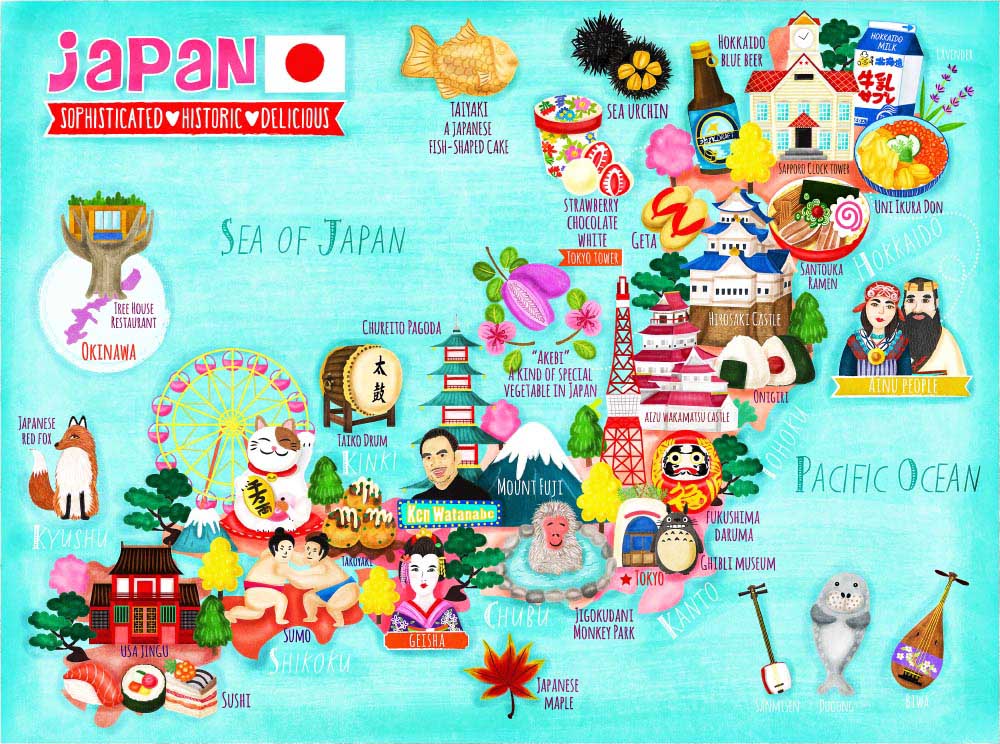 |
livwanillustration.com
|
Japan is a country I wanted to visit for a while now and so I decided to do something similar to last year's "Irish Week" (coming back this year as well) and create the Japanese Week in order 'to travel' from home...for now.
I hope you'll stick around to discover with me more about Japan, maybe learning something new and getting ideas to plan a visit there too!
WHAT TO KNOW BEFORE TRAVELLING TO JAPAN
📶WiFi
Japan is renowned for its technological vanguard, yet you
won’t be able to find free wifi everywhere. If it’s something you can’t live
without, the options are either get a pocket wifi or a sim card.
Pocket WiFi – you can both buy one or rent one. The catch is that
you have to get it BEFORE you arrive in Japan, just browse the internet for
companies who rent them. For 10 days it can costs 55€, which is 5,50€ per day…not cheap, but not that expensive after all. The pocket wifi should be your choice if you’re travelling
in a group, because it can be connected with multiple devices, but you have to
charge it.
Simcard – this choice is probably easier compared to the
pocket wifi. Pros: it’s cheaper than pocket wifi, you put it in your smartphone
and it’s done. Cons: to set the sim card you’ll need a wifi connection, the
speed isn’t that fast and there’s a data limit.
TRANSPORTATIONS🚅
| Travel Caffeine.com |
JR Pass (Japan Rail Pass) - is a personal transportation pass specifically for
foreign travellers. Travelling by train in Japan can be expensive, so getting a
pass that gives you access to multiple transportations is a choice that will save
your money and time!

A JR Pass is valid on:
- all train lines operated by Japan Railways
- other means of transportation like the JR Bus, JR Ferry and monorails
- the
Shinkansen trains (the bullet train) except for the Mizuho Shinkansen
It is not valid on:
- the Nozomi trains and other private rail companies.
A JR Pass price depends on whether you pick the Ordinary class (second class) or Green class (first class). The price changes if you opt for a
7 days, 14 days or 21 days pass.

Suica or PASMO cards - these are prepaid cards for using all the transportation nearly everywhere in Japan (metro, buses and trains). They already have a 2000 yen credit (500 of deposit) and all you have to do is bip it while entering the metro or the bus. You can get the deposit back when you’ll leave Japan, but you
might want to consider the idea of keeping it, for a future trip back to Japan,
since it has a 10 years validity period.
- Pasmo card IS VALID on JR trains, private rail trains, on Tokyo metro and on buses/taxis that shows the Pasmo logo on them. It's NOT VALID on shinkansen and express trains.
- Suica card IS VALID on the majority of public transportations: metro, buses and local trains. It is NOT VALID on shinkansen, long-distance buses and on airport shuttle buses.
Suica and Pasmo cards can also be used as a "credit card": you can pay in convenience stores (kombini) with them!
💰MONEY/CREDIT CARDS
| japan-guide.com |
The best option is to change a fair amount of money while in your home country and in your personal bank. Japan is still a cash society and, even if there're ATMs in most of the convenience stores, it's safer if you also have some physical cash with you...for an emergency.
If you need to change money in Japan, it's better to find a bank, but your airports or post offices offer the same service.
If you need to change money in Japan, it's better to find a bank, but your airports or post offices offer the same service.
So these were the main things I thought everybody should know before embarking on a transcontinental journey. These pieces of information are easy to find and yes, I talked about general stuff, but a reminder never hurt anybody!
Hope you liked this intro and that you'll enjoy the entire Japanese Week as well!
また明日
which means "see you tomorrow!"







No comments
Note: Only a member of this blog may post a comment.